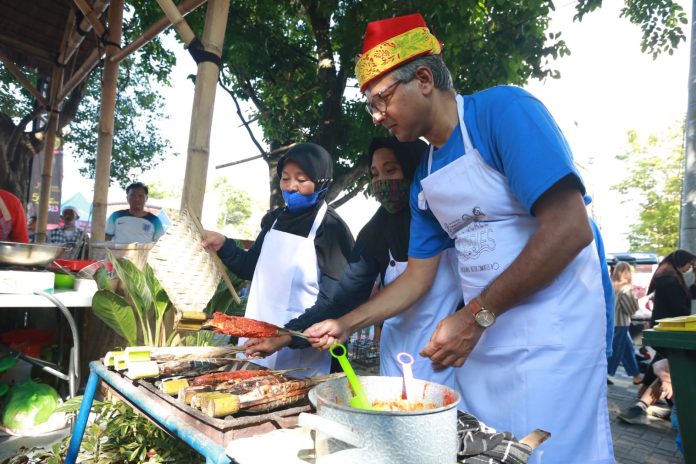BANYUWANGI – Food and Agriculture Organization of the United Nations (FAO) and the Ministry of Marine Affairs and Fisheries (KKP) are training groups of small-scale fishermen’s wives in Banyuwangi to strengthen their involvement in the fisheries value chain.
This training, which involves mothers living on the Banyuwangi coast, has run since July 2022.
While a year has passed, the training has yielded several results. One of them is the ability of fishermen’s wives to create various processed fishery products.
The products were showcased in the “Banyuwangi Fisheries Women Lively for Indonesia” which was held at Blambangan Park, Sunday (18/6).
The Head of FAO Representative for Indonesia and Timor Leste Rajendra Aryal explained that the wives of small-scale fishermen have a central role in promoting fish as a source of nutrition for daily consumption.
“It is important to recognize the role of women in small-scale fisheries. Women play a central role in promoting fish as a source of nutrition and daily consumption,” said Aryal.
During the training, various interventions have been implemented to increase the capacity of groups of women in small-scale fisheries.
The latest FAO survey conducted in Banyuwangi revealed that almost 80 percent of fishermen’s wives were not previously involved in making decisions regarding the use of income generated from the fishing activities–even though they and their husbands have almost the same access to the activities.
This indirectly shows the imbalance of the role of women in the economic sphere.
During the one year course of the project, various training and mentoring activities have been carried out to increase the group’s capacity in Banyuwangi.
Particularly in increasing awareness to have a role in decision making, developing organizational capacity, developing business, and improving the quality and competitiveness of processed fish products.
“Empowering women in the small-scale fisheries sector contributes to achieving SDGs. By increasing the capacity of their role, we can create positive changes to achieve better production, better nutrition, a better environment, and a better life,” added Aryal.
Retno Setyowati (39), an owner of a small grilled fish stall in the coastal village of Blimbingsari, which is 20 km from the city center, said the various training have enabled her and her group to learn how to package grilled fish and produce bottled chili sauce (sambal).
The training also helped her expand the market.
“We have delivered grilled fish and sambal to our customers in Jakarta and Surabaya. Not only have I been able to expand my market, but I have also learned how to set reasonable prices for my products,” said Retno.
With new knowledge and skills, Retno admitted that her household income had increased by 40 percent.
Based on existing data, small-scale fisheries play an important role in providing nutrition and income for the community.
Based on the size of the vessels used by the fishermen in Indonesia, which are under 10 GT in size, approximately 97 percent of them are small scale.
“Women’s role in coastal life not only contributes to economic and environmental sustainability, but also reflects gender equality and the importance of inclusion in decision-making,” said Machmud as Secretary of the Directorate General of Strengthening the Competitiveness of Marine and Fishery Products of KKP.
Machmud said the training program for fisherwomen held in Banyuwangi was the first in Indonesia.
The main aim of the project, he said, is to promote gender equality and climate change resilient food and livelihood systems in small-scale fishing communities.
Meanwhile, Assistant for the Economy and Development of the Government of Banyuwangi Regency Dwi Yanto added, Banyuwangi has a coastline of 173 kilometers (km).
“With that fact, there is still a lot of fishery potential that can be developed. That doesn’t include inland aquaculture fisheries, which are also quite large in number,” said Dwi.




